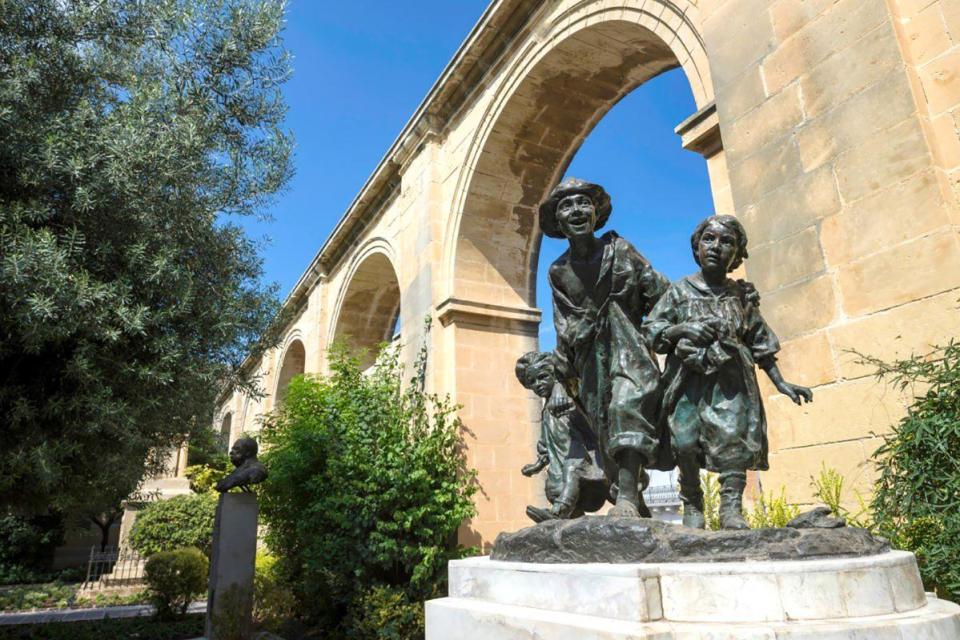‘Les Gavroches’: Hope for the future
Fr Richard Ebejer, a Salesian missionary, shares his experience among street children in Africa

I have always been fascinated by the statue Les Gavroches (‘street urchins’ in French) at the Upper Barrakka Gardens, in Valletta. The current statue is the replica of a haunting work of art by Antonio Sciortino (now found at MUŻA), with hidden layers of meaning inspired by Victor Hugo’s novel Les Misérables. It represents three ragged street children, left to fend for themselves, lost in a world that barely sees them.
I am always struck by the face of the boy in the middle whose face is lit up, leading his reluctant siblings towards a hopeful future yet to be discovered.
The statue perhaps represents a romanticised view of street children. It was only when I went to Nigeria as a missionary that I first came in contact with the harsh reality of street children. I was shocked to see so many children and young people on the streets of Lagos! I came to realise how much it was a struggle for them just to survive.
 Fr Richard Ebejer
Fr Richard EbejerStreet children are found throughout Africa. Africa is a young continent with over half the population being under the age of 25. Despite the rich resources of oil, gold, diamonds and other minerals found in the continent, poverty is quite widespread mainly due to exploitation by foreign companies and corruption.
Some children either run away from an abusive environment or else they are driven out because the family can no longer support them. By day, they scout the marketplace looking for odd little jobs, or else they run around the streets in small gangs begging, gambling and stealing. By night, they gather together for protection. They are victims of exploitation as they live on the edges of society, yet, they continue to cling to this tragic way of life without hope because it is freedom from abuse, from neglect, from forced labour.
In his time, Don Bosco met with a very similar situation when he first went to the city of Turin. As a newly ordained priest, he was shocked by the plight of hundreds of street children living in dire conditions. In response to this reality, Don Bosco eventually established the Salesian family to reach out to deprived young people at risk, not only in Italy but throughout the world. The Salesians inherited Don Bosco’s love and passion for the missions and deprived youth.
Having been in Africa myself for 10 years, I was able to see first-hand the wonderful work the Salesians are accomplishing among street children, bringing them hope in an otherwise desperate situation.
Young people are not evil; what they need is a friend who can guide them and help them
I visited different child protection centres run by the Salesians in Nigeria, Ghana and Sierra Leone, which were opened to welcome street children. These centres run different projects to reach those who are still living on the streets.
In Freetown, Sierra Leone, I visited Don Bosco Fambul, a Salesian centre that has a special street-bus, equipped with medical facilities and a mobile kitchen. It goes out at night to meet children on the streets, offering them food and medical assistance as well as useful information that would be of help to them. Most importantly, once they befriend them, they offer them the possibility to come off the street and join a programme of reintegration.
 A street kid being offered food in Nigeria.
A street kid being offered food in Nigeria.In Nigeria, I have been on the streets with Fr Linus and watched him connect with the children there. It is not easy as they are always very suspicious of anyone who tries to change their way of life. However, when one befriends them and interacts with them, one discovers that there is a basic human goodness in them and they’re not the hardened criminals that people make them out to be. Like Don Bosco, Fr Linus firmly believes that “young people are not evil; what they need is a friend who can guide them and help them”.
In a continent so rich in natural resources such as Africa, young people are indeed the richest resource of the continent. Yet, as Don Bosco used to say: “The young are that part of society so much exposed to danger and yet so rich in promise.”
There are millions of them, eager and hungry for education, longing to improve their situation in life and yearning to belong to a just and peaceful society.
The Salesians have already opened many schools, vocational technical centres, youth clubs, health centres, parishes throughout Africa. Yet, there are still many children living on the streets, often exposed to grave danger and easy victims of injustice.
 Young people are the richest resource of Africa.
Young people are the richest resource of Africa.This year, the Salesians of Don Bosco are marking the 150th anniversary since Don Bosco sent his first Salesian missionaries to Patagonia, in Argentina. Today, the Salesians can be found in 136 countries and are one of the largest networks in the world working for the benefit of young people in need.
To mark this significant anniversary, the Salesians in Malta have undertaken to support Street Children Programmes in Africa. All are invited to support them in this project.
For more information, visit www.sdb.org.mt or e-mail missions@sdb.org.mt.
Fr Richard Ebejer, a Salesian of Don Bosco, is an experienced educator and priest with a long-standing commitment to accompanying young Salesians. His missionary work has taken him to Ghana, Nigeria, Tunisia and Ireland. He currently serves as a member of the chaplaincy team at MCAST.